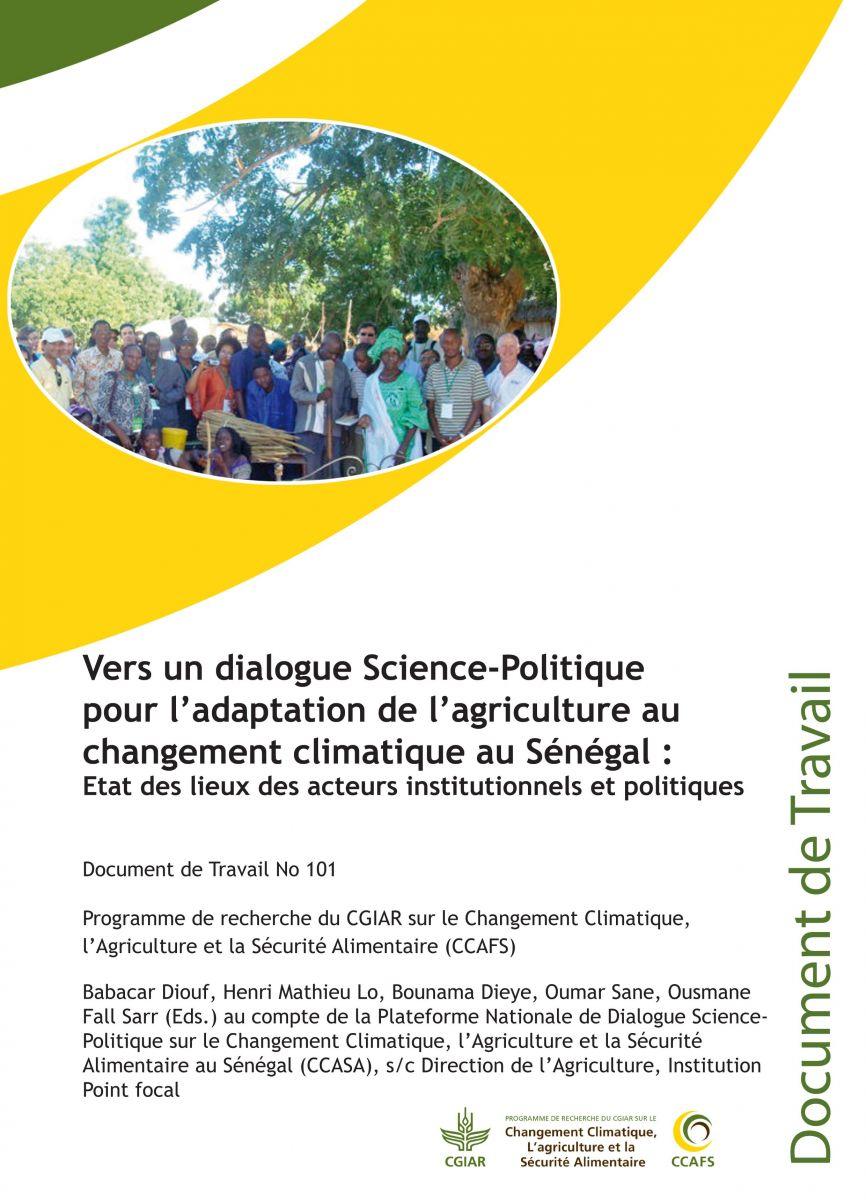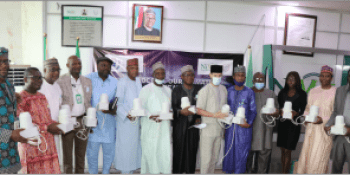Why should climate change be integrated into policy decision-making in Senegal?

The role of policymakers in anticipation and decision-making to curb the effects of food insecurity is important in a context where climate change can dangerously compromise projections.
In accordance with its 2013 roadmap and partnership with the CCAFS program, the National Science-Policy Platform of Senegal has decided to conduct a study to identify potential stakeholders actively involved in climate change issues concerning agriculture and food security, as well as success stories or implemented projects.
The study is now available under the title "Vers un dialogue Science-Politique pour l’adaptation de l’agriculture au changement climatique au Sénégal: Etat des lieux des acteurs institutionnels et politiques", in English: "Towards a Science-Policy Dialogue for Adapting Agriculture to Climate Change in Senegal: Current Situation of Institutional and Policy Stakeholders."
The study has raised several issues, including one crucial question: Why should climate change be integrated into policy decision-making?
The phenomenon of climate change has serious consequences, with major risks for food security, access to drinking water, public health and the livelihoods of rural people. Furthermore, there are also threats to investment, policies and development actions.
Impacts on agriculturein Senegal
The vulnerability of agriculture to climate change is mostly due to its heavy dependency on rainfall, which is becoming increasingly scarce and whose inter-annual variability is difficult to predict.
Generally, climate change leads to lower yields and production. Farmers' incomes continue to decline, thereby exposing them to ever more acute poverty. In addition, climate change can increase the frequency of extreme events. Indeed, there can be extended periods of drought, and floods will be much more frequent.
These extreme events will damage plants and crops as a result of prolonged lack of water or destructive floods. A prolonged drought can have an impact on soil carbon stocks, as it accelerates the mineralization of organic carbon and thereby acts on soil fertility.
Impact on animal resources in Senegal
An increase in temperature intensifies dry conditions that will affect pastoral activities by reducing the biomass and water available for herds, with consequences on mortality.
Desertification is a major threat to sustainable resource management in arid, semi-arid and dry sub-humid areas in Africa; it also jeopardizes food security and water supply.
Impact on water resources in Senegal
By raising temperatures and reducing the amount of rainfall, climate change is expected to increase water shortages. In Senegal, rainfall has been declining since 1968, with deficits ranging from 20% to 40% (Water Report, 2008). Water resources are not equitably distributed throughout the country.
Given that this resource is becoming increasingly scarce and that all economic activities are structured around it, efforts should be made as soon as possible to reflect and conduct advanced research on an optimization framework that would make it more accessible, with concerted management that would prevent wastage.
Similarly, excess water due to climate change and the resulting flooding is also harmful to plants and crops, in particular.
Impact on coastal areas in Senegal
Several countries in the West African sub-region with coastal areas have already reported the adverse effects that could be generated by the intrusion of salt water and storm surges on infrastructure and coastal ecosystems as the sea level rises. The loss of land due to 0.5 to 1 m rise in sea level occurs mainly in the most useful areas, agricultural land or the most populated areas. Furthermore, in some cases, the rising sea levels could, in the long term, result inthe flooding of rice fields, land and infrastructure. It could also displace the coastal population, flood small streams and irrigation canals, and destroy mangroves, with negative effects on oyster farming.
Impact on fisheries and fish farmingin Senegal
The waters of the Senegalese coast are known to be among the richest fishing waters in the world.
However, climate change will, in the long term, help to transform the climate at local, national and regional levels. Such transformation is evident in changes in climate parameters such as temperature, wind and rainfall, which will lead to variation in the frequency and intensity of extreme weather events (droughts, floods, heat waves, and rising sea level).
A rise in sea levels for which melting ice is 30% responsible and a rise in sea surface temperature to 70°C will change the distribution of fishery resources and deteriorate marine and coastal biodiversity. It could also have negative impacts on food security because fish products form an important part of the animal proteins (75%) required as food and nutrition for the population.
Furthermore, climate change-induced environmental stress, coupled with the overexploitation of resources, will put more pressure on fishing and deplete fish stocks, leading to conflicts over access to and control of fishery resources.
Similar Articles:
Key conditions for effective dialogue between researchers and policymakers in Mali
A new knowledge sharing platform helps Mali to fight more effectively against climate change
Making smart decisions for a food-secure future
Smart solutions for climatefor Mali
Climate smart agriculture integrated into decision-making in Ghana
Sékou Touré is Communication Officer withthe CCAFS West Africa Program.
Robert Zougmoré is Director of the CCAFS West Africa Program.
Bounama Dieye works in the Department of Agriculture, Ministry of Agriculture and Rural Equipment, Dakar, Senegal.




